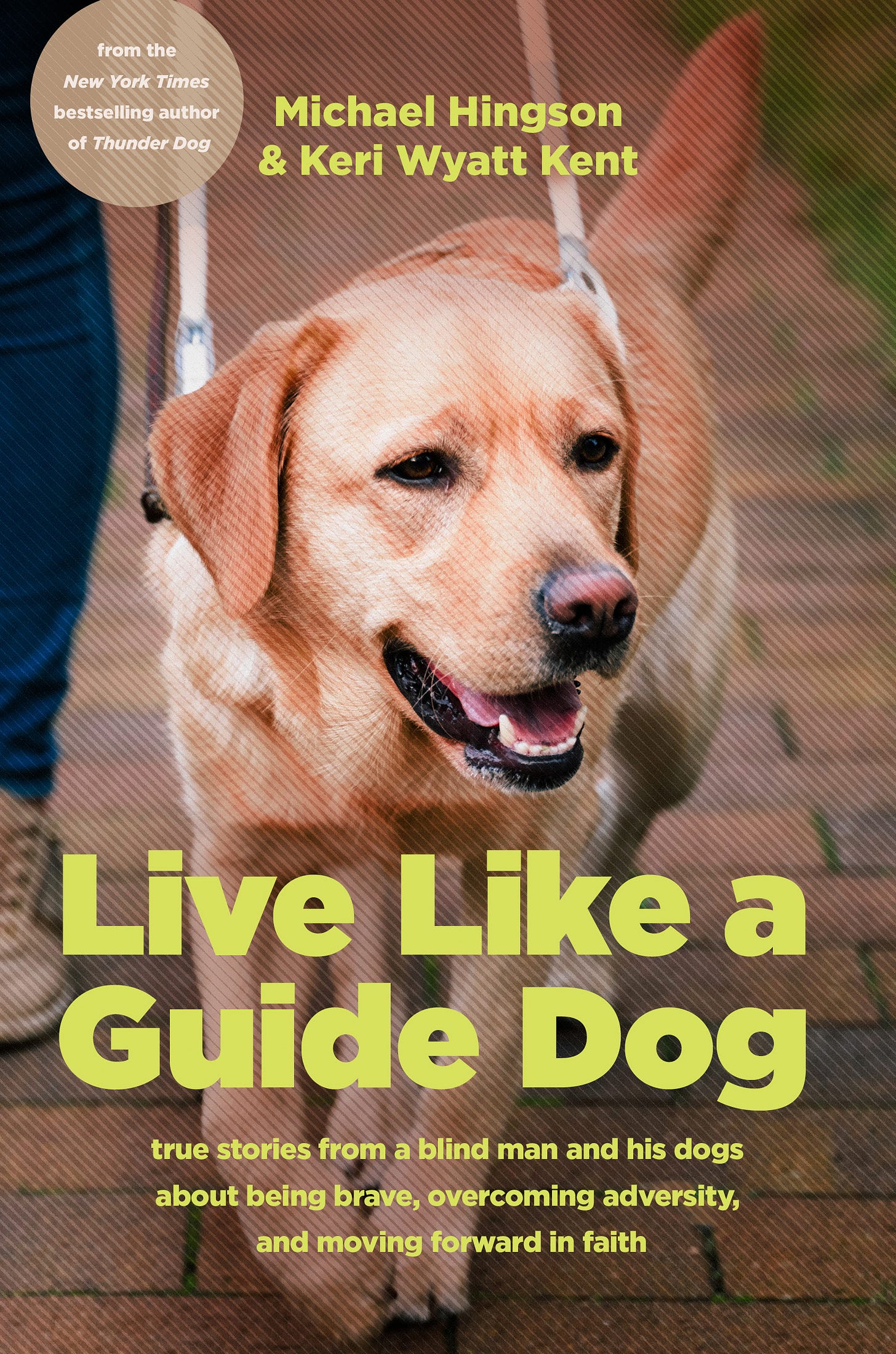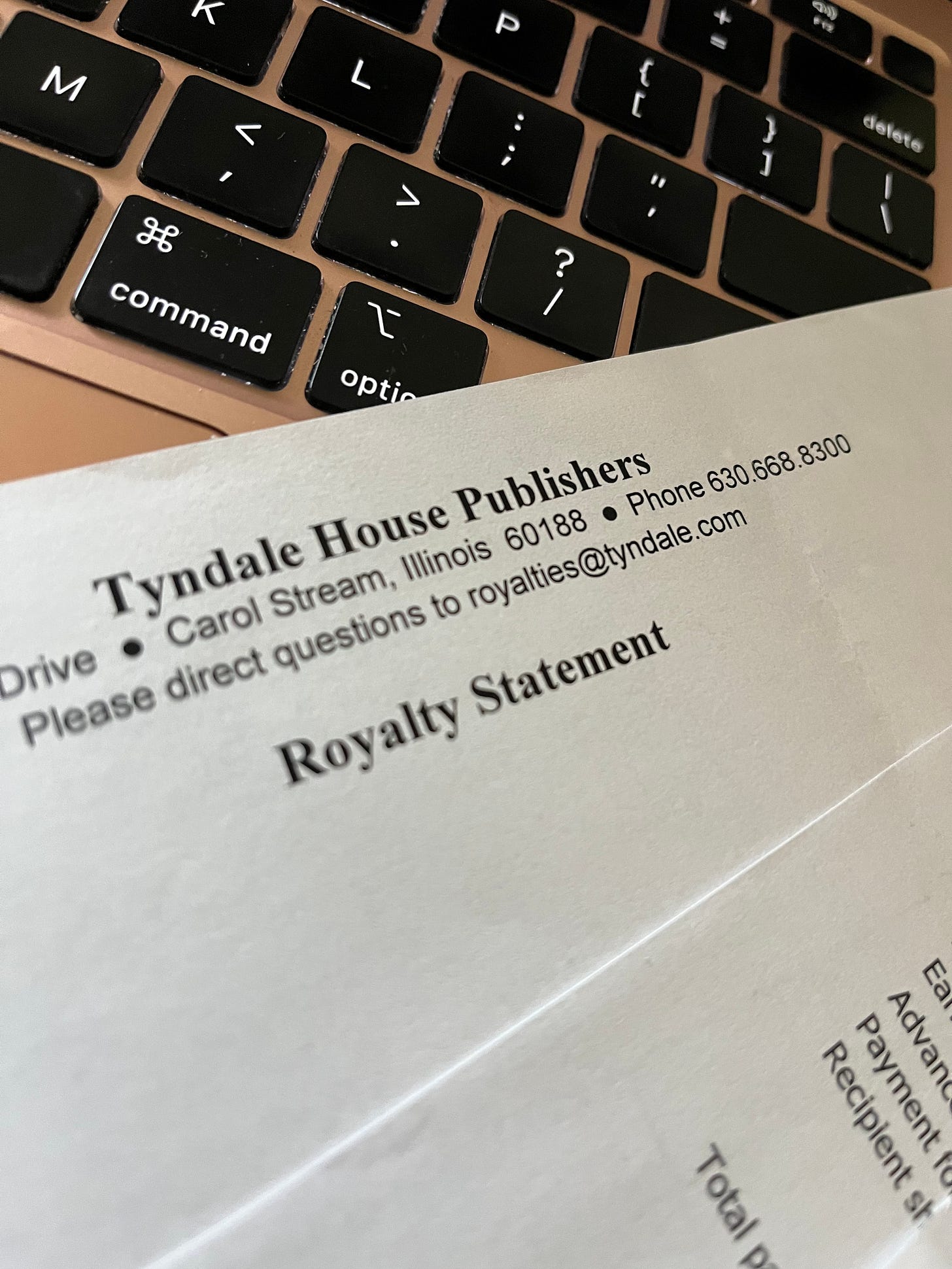Three questions writers ask me
And two discount codes just for you!
Questions! I get questions!
I spend a lot of my time talking to writers, offering coaching and advice, answering questions. Today I want to tackle three questions—because if you’re a writer or aspire to be one you probably have these same questions.
But before we jump in, I’ve got the inside scoop on a deal for you: my latest book releases next month, and you can get 25 percent off if you preorder it from Barnes & Noble today!
Live Like a Guide Dog, which I coauthored with NYT bestselling author Michael Hingson, offers strategies on overcoming fear, drawn from Michael’s life of walking beside guide dogs since he was a teenager. He and his brave guide dog Roselle escaped the World Trade Center on 9/11. He knows a thing or two about how to turn your fear into courage. You’re going to love this book, full of dog stories and practical wisdom.
This discount is for rewards and premium members. (B&N Rewards is a free program!) Use the code PREORDER25 to save on your preorder this week. Hurry though, this offer expires July 17.
As I’ve mentioned before, preordering a book is one of the best ways to support authors, so
Share this post to tell your friends about that B&N sale!
Okay, now let’s get to those publishing and writing questions. (And that second discount code—you’re going to love it).
Q: How does the money work?
Whoo boy that’s a big one, right? Talking about money always feels fraught. I’m going to focus on one small aspect of the finances of publishing that one of my clients was asking me this week: how do agents get paid?
To answer that, we have to back up and say that agents represent authors, to get their books published by traditional royalty publishers. See this article for more on what that means.
If you self-publish, you don’t need an agent, but no one is paying you to write, either. You’re actually paying the costs of production yourself. That’s why it’s called self-publishing. (See this popular blog post for more info)
You do not pay an agent up front. They only get paid if they get you a deal with a publisher. The standard commission is around 15 percent. So they want to get you the best deal possible.
Royalty publishers pay authors for the right to publish their book. They typically offer an advance, a sum of money, to the author. When the book is printed and published, the publisher sells the books, through bookstores and online sellers. They get most of the proceeds from those sales, to cover the cost of editing, designing, printing and distributing their book. Legit royalty publishers pay for all of that production cost. Their share of book sales also includes a bit of profit—they’re a business, so they expect to make some money. They should make that by book sales. Each book that sells also earns a royalty for the author, a percentage of the book’s sale price.
However, the royalties on your initial sales go toward paying back your advance, so to speak. So if you get a $5000 advance, and you earn a royalty of $5 per book, you’d have to sell (not you personally but all retailers) 1000 books for your book to “earn out” which means the book has earned enough in royalties to pay back the initial advance. (Advances and royalty percentages vary, I’m using round numbers to make it easier since we are writers, not math majors.)
You’d then start receiving royalties on subsequent books sold.
Traditionally, an agent earns a 15 percent commission of all the book’s revenues, including the advance, and any royalties if the book earns out. (Only about 25 to 30 percent of books do so). If your book does not earn out, you don’t have to pay back the advance. Your agent would get $750 of your initial advance, paid to her or him directly by the publishing company. So you’d actualy receive $4250 of your advance.
Royalties are negotiable. Contracts are negotiable. Getting in the door at a publisher is hard. Agents negotiate. They build relationships with editors and publishers. They know how to present your book in a way that will get a “yes.” Many publishers (but not all) will only work with authors who are represented by an agent. Agents definitely earn their 15 percent—and they represent you, not the publisher. A good agent understands the legalese in a book contract, which typically runs more than 20 pages.
Q: How can I learn more about publishing?
If the above explanation of just one small part of the publishing industry feels daunting, you may be asking—other than this newsletter, where can I learn more about publishing?
There’s a lot to learn, which is why I recommend writers attend a writers’ conference. It’s a worthwhile investment of time and money because conferences offer:
Classes on writing and publishing, industries that are rapidly changing
Opportunities to meet with agents and editors to pitch your book idea
Opportunities for coaching and manuscript critique to get encouragement and feedback
The chance to meet and network with other writers to form lifelong friendships
I’m teaching and coaching at this year’s West Coast Christian Writers Conference, which will be held just outside Sacramento this November. Early-bird registration is going on right now. And this week, I’ve got a registration discount code to save you $50! To sign up click the button below and when you register, use the code KENT to get your discount off the early-bird registration price. A lot of the classes and coaching appointments are filling up so you’ll want to do that as soon as possible.
If you sign up, I’d love to meet you at the conference. Leave a comment below and we’ll arrange it.
Q: What’s my next step?
Your next step on the writing journey depends on where you are, of course. But many writers feel struck, uncertain about which step to take. Writers are learners. We’re curious and always asking questions, doing research, honing our craft. But we still benefit from guidance and help. Maybe you’ve already published a book and you’re wondering what is next?
I’m super excited to invite you to a brand-new offering at West Coast this year: the Career/professional author CREW. If you’ve ever been to West Coast, you know that CREW stands for Connection, Refinement, Equipping, Wisdom. There are several to choose from. This all-day pre-conference seminar offers you the chance to be in a small seminar setting with other authors, led by an industry professional.
This specialized small-group instruction will be offered before (and after) the regular conference on Wednesday, November 6 (in-person) and Saturday, November 9 (online only). CREWs are small mentoring groups, and spots are available first come, first serve. In 2023, this popular add-on sold out, so don't delay!
If you’ve already been published, you might think you don’t need to invest in attending a writers’ conference. But the connections you make with other authors and industry professionals are invaluable. And this year, there’s a CREW just for intermediate to advanced writers looking to build their career.
I’ve been at this for decades and am still always learning, especially because the publishing world changes so rapidly. And there is something magical about gathering with other writers, talking writing and books for two or three days.
If you have published, but want to figure out your next writing step, the West Coast Christian Writers conference has an option you will definitely want to take advantage of. Led by New York Times bestselling author and writing coach Susy Flory, and a team of other professionals (including yours truly) this crew will help you build your writing career.
This new for 2024 CREW mentoring group is for intermediate to advanced writers, by application only.
To qualify for this CREW, you should have a consistent publishing history, meaning more than one item.
Whether you’ve self-published or traditionally published, if you’ve written books or articles or hosted a podcast, this CREW is for you. Learn all the details and register by clicking the button below. And be sure to use the discount code KENT to receive $50 off your registration.
Got more questions about writing and publishing? Leave them in the comments section, and I’ll select a few to answer in a future newsletter.





One of these days I will get my shi...stuff together and seriously pursue publication. 🤷🏻